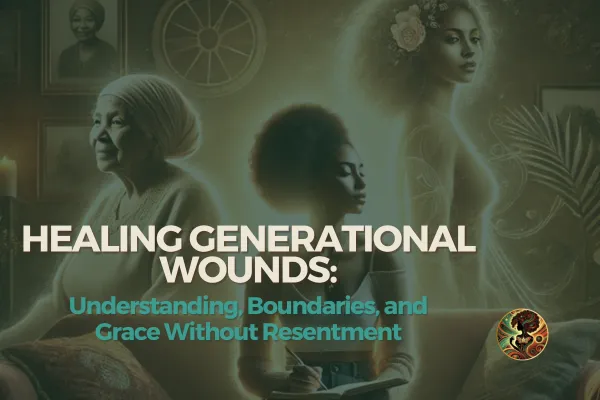
Healing Generational Wounds:Understanding, Boundaries, and Grace Without Resentment
I was sitting on my aunt’s couch in Brooklyn when I heard the story—my great-grandmother had been murdered by her boyfriend.
She was the first murder ever recorded in our village in Guyana. Her story had become folklore—a tale told to warn children about love, anger, and what happens when pain goes unchecked.
But sitting there that day, it hit me differently. It didn’t feel like a lesson for kids anymore. It felt personal—like a story I already knew in my bones.
I thought about my women cousins and their relationships with men. My mind ran through their choices, my choices, and the ways we seemed to carry the same patterns. I remembered what it felt like to watch my parents argue—the tension in my body, the fear of conflict, and the ache of wishing things were different.
Not every story was about violence, but the patterns were still there—patterns of choosing partners, staying too long, and accepting pain as part of love.
And that’s when I understood something that changed how I see healing:
We inherit wounds our parents still carry.
Understanding the Wounds We Inherit
It’s easy to talk about generational trauma as something passed down, but what we don’t always acknowledge is that the people who gave us those wounds—our parents, grandparents, and elders—are still holding them too.
For Black women, this inheritance is layered. We carry the stories of survival, the fears of loss, and the patterns of silence that were taught as protection. And often, so do the people who raised us.
Our parents’ behaviors—their control, their fears, their struggles with intimacy—aren’t just about us. They’re about them. About the pain they never got to process and the tools they never had to do so.
Healing doesn’t mean excusing the harm. But it does mean understanding the story behind it—not to stay stuck, but to move forward with more clarity and compassion.
Why Their Stories Matter
I used to be angry. Angry at what I didn’t get. Angry at the emotional absence and the ways I felt unseen growing up.
But as I learned more about my family’s history, my anger started to shift. I began to see my parents—not just as my parents—but as people. People who had dreams, struggles, and wounds of their own.
My father’s anger wasn’t about him being mean—it was rooted in disappointment and fear. My mother’s people pleasing and mood swings weren’t just about her failures—it came from a life where she felt unseen and a yearning for something different.
And their bodies held the stories of our ancestors too.
Learning these stories didn’t erase my pain, but it helped me understand it. And that understanding? It made space for healing—not just for me, but for them too.
Healing Without Anger or Resentment
One of the hardest parts of healing generational wounds is learning how to set boundaries without needing anger to justify them.
Boundaries aren’t punishment—they’re protection.
But many of us only feel justified in setting them when we’re hurt or angry. And while those emotions can push us to take action, they aren’t sustainable.
Emotional maturity in healing means learning to set boundaries from a place of clarity—not resentment. It’s saying:
“I love you, but I can’t engage in this dynamic anymore.”
“I see your pain, but it’s not mine to carry.”
“I understand why you respond this way, but I need to choose something different for myself.”
It’s acknowledging their humanity while still honoring your own needs.
What Does Emotional Maturity Look Like?
Curiosity Over Judgment – Ask yourself why your parents behave the way they do. What were their experiences? What tools didn’t they have? Curiosity creates space for compassion without erasing accountability.
Boundaries With Love – Learn to set boundaries as acts of self-care, not punishment. Boundaries grounded in love and respect are more likely to be honored.
Self-Reflection – Look at the ways you may be continuing the patterns you’ve inherited. Healing means taking responsibility for what’s yours—even when it’s hard.
Release Resentment – Forgiveness doesn’t mean excusing harm. It means releasing the bitterness so it doesn’t control you.
Focus on Growth, Not Perfection – Healing isn’t about getting everything right—it’s about progress. Celebrate the small wins.
Grace: The Key to Breaking Cycles
Grace is what makes healing sustainable.
It’s what reminds us that we’re all doing the best we can with what we know. And for many of our parents, they didn’t know better. They didn’t have the language or tools we do now.
Grace lets us:
Hold compassion for their struggles without excusing their harm.
Forgive so we can let go, not so we can stay in unhealthy dynamics.
Love from a distance when closeness feels unsafe.
Grace isn’t weakness. It’s strength wrapped in softness. And when paired with accountability and boundaries, it’s the foundation for real, lasting change.
Final Thoughts: Healing for Us and Them
Sitting on that couch in Brooklyn, I realized something: healing isn’t just about me.
It’s about learning the stories, so I understand where I come from.
It’s about letting go of resentment, so I can move forward without bitterness.
It’s about setting boundaries, so I protect my peace while honoring theirs.
Because as much as we inherit their wounds, we also inherit their strength, resilience, and hope.
Healing isn’t about rewriting their stories—it’s about writing a new ending for ours.
And when we do, we don’t just heal ourselves—we create space for them to heal too.
